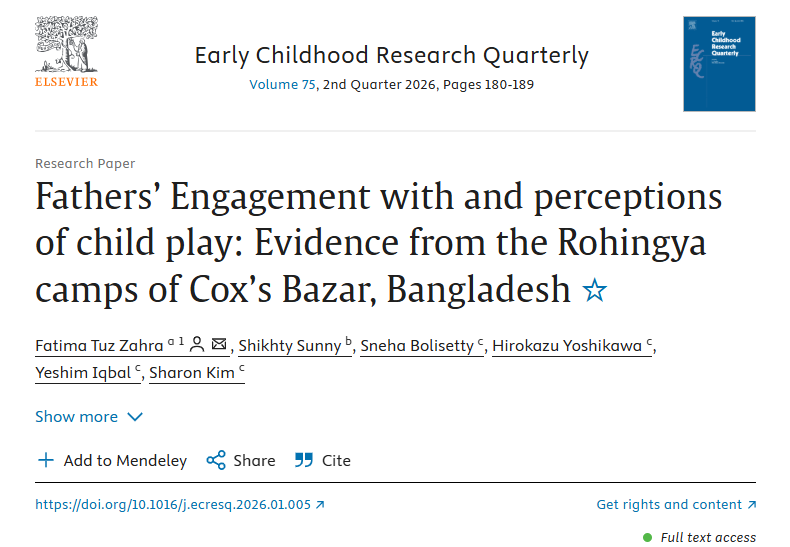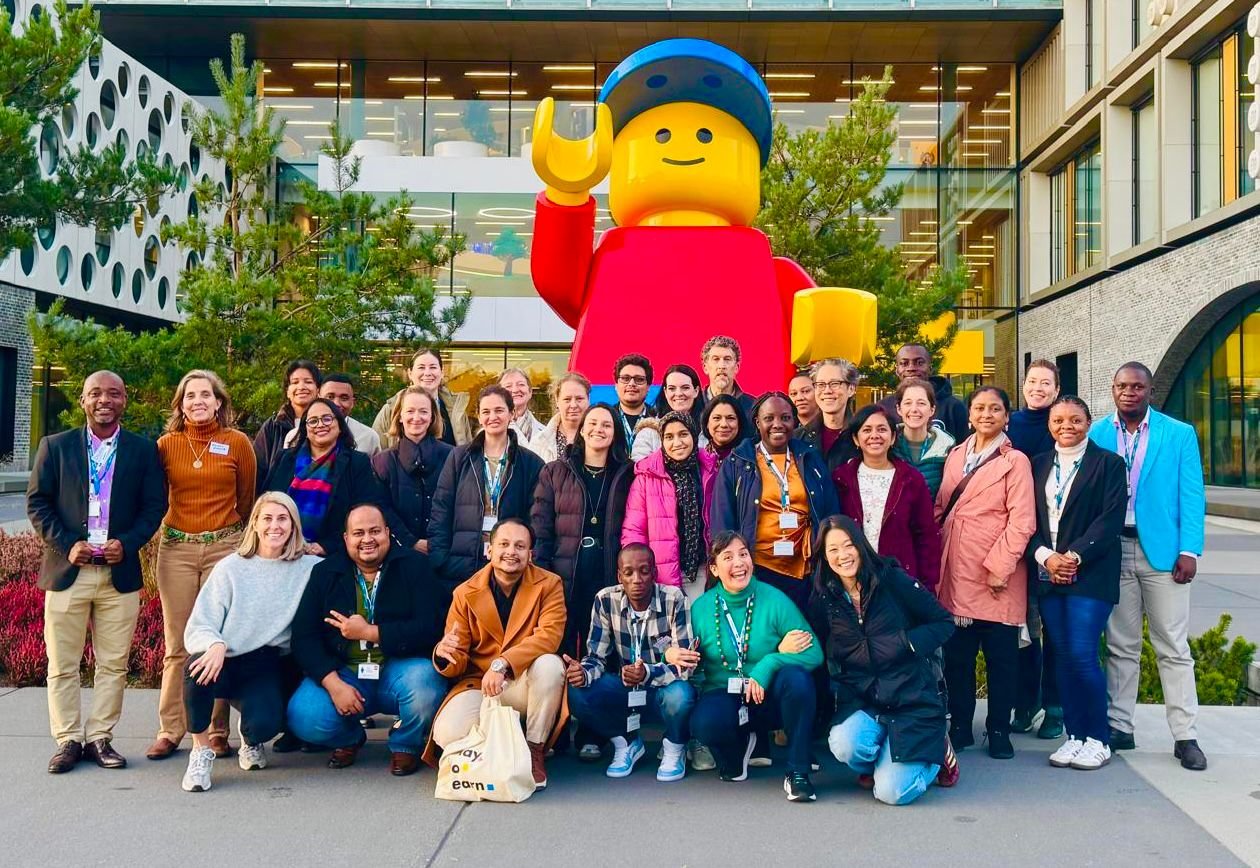Resources
The Play to Learn team has published a paper on Fathers’ Engagement with and perceptions of child play: Evidence from the Rohingya camps
Research on father engagement is heavily focused on Western families. Western-based programs to support fathers often do so in an individualistic manner, failing to address cultures in places where collective care is common. Limited existing research on fathers’ involvement in play emphasizes the influence of income and working status on fathers’ views on play. Overall, there is very little research on fathers' perceptions of play in refugee contexts, and there is no extensive study exploring this topic in the Rohingya context. In this context of forced displacement, we ask the following research question about the Rohingya fathers' perceptions of play.
Research Question:
How do fathers perceive children’s play in both structured (Humanitarian Play Labs) as well as unstructured (home and surrounding areas) play settings in the Rohingya camps in Cox’s Bazar, Bangladesh?
Hirokazu Yoshikawa Awarded the 2025 Klaus J. Jacobs Research Prize
The award recognizes his pioneering research on the ways public policies and programs, particularly in early childhood and immigration, shape human development.
Engage team members participate in the project’s final Comunity of Practice convening
From November 3-6, 2025, Hirokazu Yoshikawa and Sharon Kim represented Global TIES for Children at the final Engage Community of Practice convening, organized by EDC and hosted at the LEGO Foundation headquarters in Billund, Denmark.
Over three days, partners from across the Engage portfolio shared evidence and lessons on strengthening student engagement in early childhood and primary education across diverse contexts.
The sessions focused on:
Insights from implementing and adapting the Engage tools
Trends emerging across countries and developmental levels
How data can drive program improvement and system-level change
This convening wasn’t a “show-and-tell.” It was hands-on, reflective, and honest about what it takes to embed child-centered, playful learning approaches into teaching and learning systems—and sustain them.
The iRRRd team has published their first paper on their ongoing pre-natal birth cohort study in Bangladesh
We’re proud to share the work of our NYU-TIES colleague, Alice Wuermli, and her coauthors, who have just published the first major paper of their ongoing pre-natal birth cohort study in Bangladesh.
This cohort profile paper outlines the study's foundations, sets the stage for future publications, and offers a powerful reminder of why early childhood research matters—not just for developmental science, but for creating real-world impact in diverse contexts. At Global TIES we are committed to bridging rigorous evidence with meaningful action.
Read Alice’s post to learn more about the study’s insights and the implications they hold for early childhood initiatives. Kudos to Alice and the entire research team for their hard work and dedication.
Prof. Hirokazu Yoshikawa participated in the launch of a new global research partnership to study the Tirana School Street model
Prof. Yoshikawa participated in the launch of a new global research partnership with Epoka University School of Architecture and Planning to study the Tirana School Street model.
Global TIES, The Agency Fund & NYU Office of the Provost co-hosted The Agency Summit
The Global TIES team was proud to co-host on NYU’s campus, The Agency Summit with The Agency Fund and NYU Office of the Provost. Organized alongside #UNGA week here in New York City, The Agency Summit on Friday, September 26th, was designed to “foster collaboration between researchers, practitioners, and funders to explore how personal and collective agency can be harnessed to promote sustainable development outcome.”
The full-day agenda was opened by heavy-hitters Hazel Markus, Karla Hoff, and Joseph E. Stiglitz, and included many engaging conversations.
In a day full of standout moments, we want to highlight the “Practice” panel with Tarun Cherukuri, Amanda Beatty, Carolina Trivelli Avila, and Hirokazu Yoshikawa (moderated by our very own Florencia Lopez Boo): a grounded conversation on turning evidence into decisions that communities can actually use.
We loved Kate Schwartz’s reflections on implementation, measuring what matters, building feedback loops, and staying close to context.
Prof. Hirokazu Yoshikawa presented Engage tools at UKFIET alongside the LEGO team
Our very own Hirokazu Yoshikawa presented alongside the The LEGO Foundation Engage research team from South Africa, Colombia, Bangladesh, Sierra Leone, Uganda, Denmark to a packed room.
The symposium showcased findings from a global research partnership using the Engage observation tool, now in its 6th year of development. This innovative toolkit measures how adults support children’s engagement in learning – at home and in classrooms – across four dimensions: Exploration, Agency, Social & personal connection, Emotional climate.
The results are powerful: engagement not only boosts academic skills, but also supports social and emotional learning. Insights like these are shaping how we measure adult–child interactions and design programs that better support children’s learning across the early years and primary school.
Global TIES & University of Cape Coast co-host LEARN Methods Workshop in Accra, Ghana
In July 2025, LEARN scholars from Ghana came together in Accra for their first annual methods workshop—five days of hands-on training focused on measure development and psychometric analysis. By investing in these skills, LEARN scholars are building the capacity to advance research on learning variability.
Global TIES & UniAndes co-host LEARN Methods Workshop in Bogota, Colombia
in June 2025, TIES co-hosted the LEARN Summer Methods Workshop with our partners, Universidad de Los Andes, bringing together early-career scholars and professors from across Colombia for five days of immersive training in psychometrics and measurement development.
Early Childhood Parenting Support – Call Quality Instrument (ECPS-CQI)
The ECPS-CQI instrument was developed in English by Anaga Ramachandranm, Dalia Al Ogaily, Kate Schwartz, Joyce Rafla and Hirokazu Yoshikawa and used to measure the quality of interactions during a phone call with a parent or caregiver. The instrument assesses the domains of relationship with family, responsiveness to family strength, needs, and culture, facilitation of caregiver-child interaction, and active listening. The ECPS-CQI tool has shown promising evidence for reliability and validity, and with caution, it can be used for intended purposes with similar samples/contexts.
LEARN scholars came together in Germany to advance research on learning variability: how children grow and learn across time, groups, & contexts
A meaningful gathering in Germany, where LEARN and LEVANTE scholars came together to exchange ideas, build connections, and advance research on learning variability—how children grow and learn across time, groups, and contexts.
With support from the Jacobs Foundation, LEARN program—led by NYU, Universidad de los Andes, and the University of Cape Coast—empowers early-career scholars to shape research that reflects their local realities and drives more equitable, context-informed approaches to supporting children’s learning.
Moments like these remind us that global progress begins with meaningful relationships!
Competing or complementary goals for primary education: social-emotional learning across the Nigerien education system
This paper explores how SEL is perceived and implemented in the primary schools of conflict-affected Diffa, offering a unique lens into the diverse interpretations of SEL by various stakeholders.
Through a meticulous analysis of 58 semi-structured interviews encompassing a broad spectrum of perspectives—from Ministry officials and NGOs to school directors and parents—this study uncovers five distinct conceptualizations of SEL. Each reflects the priorities and concerns rooted in the stakeholders' experiences with conflict, trauma, psychosocial challenges, poverty, and religious beliefs. These findings highlight the varied expectations and objectives for SEL among different groups and show the complexity of integrating such programs in environments where education itself is under siege by myriad challenges.
Authors: Sarah Kabay, Hirokazu Yoshikawa, and Lindsay Brown.
KEYWORDS: Primary Education, Sub-Saharan Africa, Emotional Learning, Social Development, Conflict Resolution
Cluster randomized controlled trial of a phone-based caregiver support and parenting program for Syrian and Jordanian families with young children
This study assessed a 6-month phone-based early childhood development (ECD) intervention for Syrian and Jordanian caregivers in Jordan
Supporting Children’s Holistic Development in Contexts of Conflict and Crisis: Lessons from a decade of striving towards research that is effective, equitable and sustainable
In reflecting upon a decade of research at NYU Global TIES aimed at supporting children's holistic development within contexts of conflict and crisis, this white paper encapsulates our collective learnings from working with a network of actors in low- and middle-income and conflict affected contexts who aim to understand what works, how, and for whom. The goal of this paper is to distill insights from the diverse perspectives and experiences of dedicated researchers, inspire action, and provide recommendations for a future distinguished by inclusive and impactful outcomes.
বাংলাদেশের কক্সবাজারের রোহিঙ্গা ক্যাম্প এবং হোস্ট কমিউনিটিতে ফাদার এনগেজমেন্ট মডেলের প্রভাব: একটি র্যান্ডোমাইজড কন্ট্রোল (Randomized Control) ট্রায়াল
This study is a causal impact evaluation of Watch, Play, Learn (WPL), a program by Sesame Workshop that consists of videos that aim to bring playful early learning opportunities to children, especially those affected by conflict and crisis, via mobile phones. This study focused on the effects of WPL math and social-emotional skills content delivered to Venezuelan migrants and Colombian children living in communities in Colombia where families and children face challenges in accessing essential services, including early education. Implementation was led by the Colombia office of Innovations for Poverty Action.
Effects of a Father Engagement Model in Rohingya Camps and Host Communities in Cox’s Bazar, Bangladesh: A Randomized Controlled Trial
This study is a causal impact evaluation of Watch, Play, Learn (WPL), a program by Sesame Workshop that consists of videos that aim to bring playful early learning opportunities to children, especially those affected by conflict and crisis, via mobile phones. This study focused on the effects of WPL math and social-emotional skills content delivered to Venezuelan migrants and Colombian children living in communities in Colombia where families and children face challenges in accessing essential services, including early education. Implementation was led by the Colombia office of Innovations for Poverty Action.



















